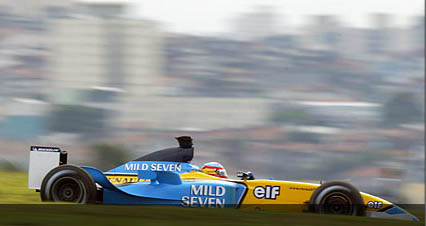
Kimi Raikkonen avoided all the accidents and hazards and won a drama-filled Brazilian Grand Prix in his West McLaren-Mercedes on April 6. His second Formula One victory came just two weeks after his maiden win in Malaysia.
The 71-lap race at the Interlagos circuit was stopped as leader Giancarlo Fisichella began Lap 55 because of separate accidents involving Mark Webber, who crashed his Jaguar Cosworth in the final turn, and then Fernando Alonso, who crashed his Mild Seven Renault after hitting debris from Webber's accident.
Fisichella had taken the lead in his Benson & Hedges Jordan-Ford on Lap 54, and the red flag came out to stop the race just as he completed Lap 55. But the rules declare the official finishing positions will be the running order two laps before the red flag is shown. And the finishing order on Lap 53 had Raikkonen in first, followed by Fisichella and Alonso.
"What a race!" Raikkonen said. "I think with some of the bad luck I have experienced in the past, it was time that I was lucky. Giancarlo overtook me when I went wide. I was coming into the pits for my final stop when the race was red-flagged."
As more than 75 percent of the race had been completed, it was not restarted. For a few joyous minutes, Fisichella thought that he had won his first Grand Prix, only to learn that he was actually classified second. This is the sixth time in his F1 career that he has finished second.
"We really believed that we had won just after the race," Fisichella said. "It was an amazing moment, but unfortunately I finished second. But it's a fantastic result. I would like to say thanks to the team. We did a fantastic strategy, and it's a very important result for us."
While Alonso was taken to the hospital for observation, neither he nor Webber suffered any serious injuries.
The Safety Car came out for the final time because of the Webber accident, and it was traveling so slowly that Fisichella's car overheated and caught fire as he brought it into the pits.
Every driver had a tale to tell in this race with a but or an if something had not happened "I could have been in the points"
If David Coulthard had not pitted on Lap 52, he probably would have won. As it was, he ended up fourth in his McLaren. Heinz-Harald Frentzen started from the pits with a full load of fuel in his Sauber-Petronas and made his first pit stop on Lap 54. As the finishing order was determined after 53 laps, he was classed fifth.
1995 Indianapolis 500 winner Jacques Villeneuve slid off the track at one stage but managed to bring his Lucky Strike BAR-Honda home sixth. Webber was classed seventh. Jarno Trulli made a pit stop on Lap 53 and dropped from sixth to eighth. Ralf Schumacher's Williams-BMW and Cristiano da Matta's Panasonic Toyota rounded out the 10 classified finishers.
Heavy rain Sunday morning delayed the start of the race by 15 minutes. Because the track was still very wet, the first nine laps of the race were run behind the Safety Car. When the race was finally started, pole sitter Rubens Barrichello took the lead in his Ferrari.
Barrichello, Coulthard and Raikkonen would all take turns at the front of the pack. Barrichello was leading easily when his car stopped with fuel feed problems on Lap 47. He has finished only once in 11 starts at his home event.
Reigning World Champion Michael Schumacher started seventh and had worked his way up to third before he spun and crashed in Turn 3. This was the first time since the 1999 European Grand Prix in October 1999 that both Ferraris have failed to finish.
The river of water running across the track at Turn 3 claimed quite a few victims including Michael Schumacher, Jos Verstappen (European Minardi-Cosworth), 2000 Indianapolis 500 winner Juan Pablo Montoya (Williams-BMW), Jenson Button (Lucky Strike BAR-Honda) and Antonio Pizzonia (Jaguar-Cosworth).
In another accident in Turn 1, the front suspension broke on Ralf Firman's B&H Jordan-Ford, and that sent him spinning into Oliver Panis' Toyota.
It was a wet and wild race. In all, the Safety Car came out four times. Most drivers would have had to pit again, so the outcome of the race would have been different if it had run the full 71 laps. But Raikkonen was in the right place at the right time to take the victory.
Raikkonen averaged 94.711 mph (152.423 km/h) to complete the shortened 53-lap, 141.888-mile (228.347 km) race in one hour, 29 minutes and 53.179 seconds. His margin of victory was .831 of a second.
The Brazilian Grand Prix is the third of 16 in this year's FIA Formula One World Championship that includes the fourth annual United States Grand Prix on Sept. 28 at the Indianapolis Motor Speedway. The next round is the San Marino Grand Prix on April 20. |
